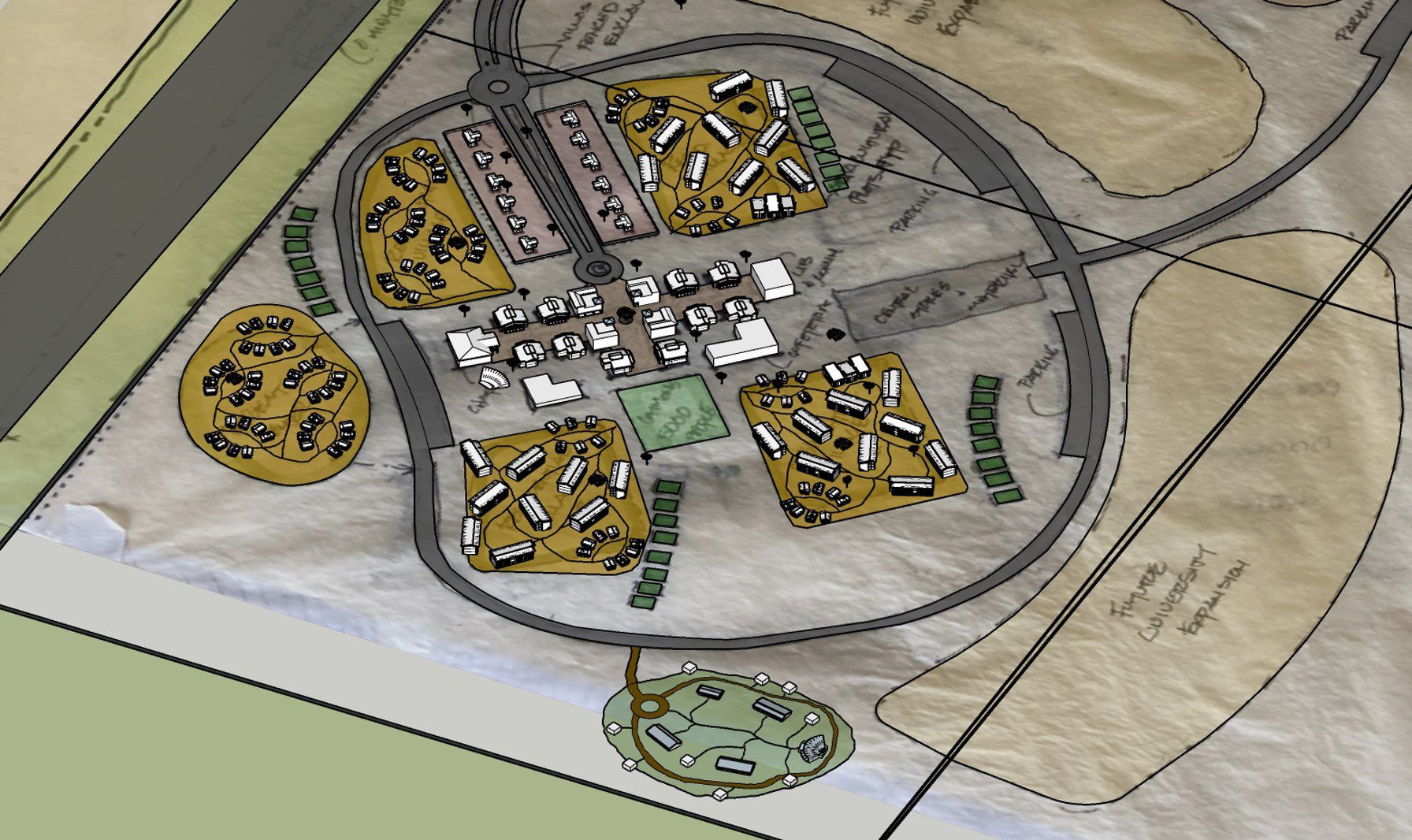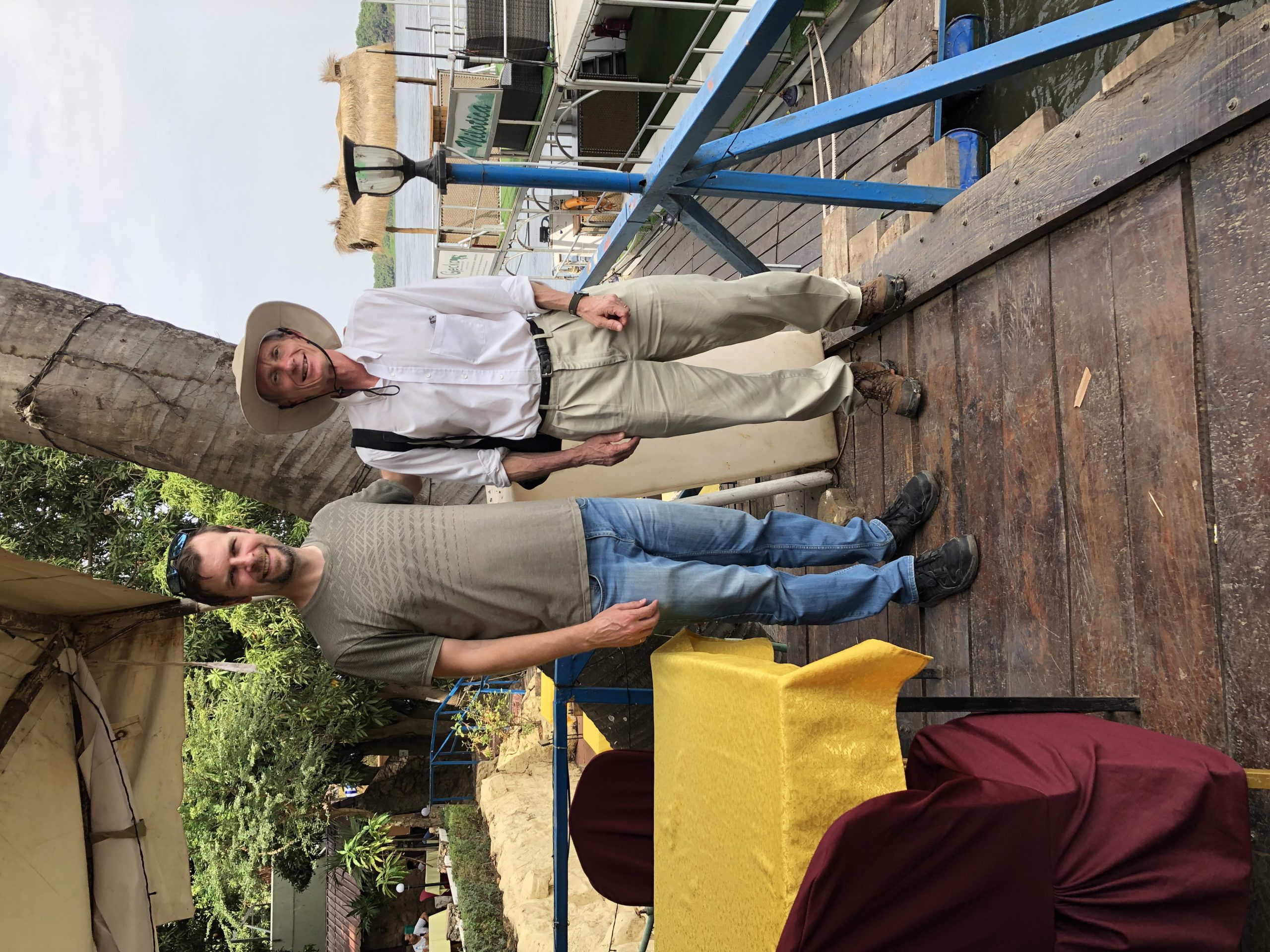
One of WithersRavenel’s most senior engineers recently returned from a mission trip to Africa, where he helped lay the groundwork for what will be a new university.
Utilities Engineer Michael Wicker, PE, was part of a group from Engineering Ministries International (EMI) that went to the rural community of Rokon in South Sudan. The goal of the trip was to begin the master planning process for what will eventually become a 5,000-student university, located about 50 miles from the capital city of Juba.
EMI is a worldwide organization which connects engineers and architects to local ministries around the world. The professionals help the local ministries plan and design projects or assist with construction management. Michael was part of a team of U.S. volunteers and Africa-based EMI staffers helping the local Episcopal diocese in South Sudan, along with government officials and community leaders, with the university project.
The final goal for the 1.2-mile square tract to be developed is ambitious: A university site to include a central building, academic buildings, chapel, cafeteria, and laboratories along with a residential village to include student housing, other buildings, and agricultural plots. Some students will live on site, while others will commute. While the execution of the final vision through all 3 phases recommended by the team may still take 20 years, according to Michael, the early work accomplished by the EMI team is vital to the school’s future.
A lot of EMI trips are this planning stage, to start the process and get the project going,Michael said. They assist a lot of hospitals, orphanages, and schools. But I don’t think they’ve tackled a university of this size before. The benefit of the university to South Sudan would be great, as there is a large demand for secondary education that often sends students to other countries. There are currently a few colleges scattered throughout the country, but the local diocese envisions this site as a centralized Christian university to solidify South Sudan’s higher education offerings.

Planning for success
The challenges for the project are many: funding needs, lack of infrastructure with few paved roads, an occasionally violent and unstable national political landscape, and a rainy season that can bring devastating floods.
But Michael and the team were not deterred from their mission. Architects on the team were focused on a phased site building plan and design, and an electrical engineer designed a system that combined generators and solar arrays. Michael’s expertise in water, wastewater, and stormwater engineering was put to good use, as was his experience with site development.
The project is not too different from our land development projects,Michael said. Initially the developer has to do some due diligence, come up with a conceptual plan, go in and get financing, as well as begin the planning process through the government entity to approve it.”
Michael’s plans for water and wastewater were defined by the site. Rokon is a rural community with a primary school, health clinic, scattered villages, market, and governmental building. While it is located on a main highway, the road is not paved. And there is no electrical, water or sewer infrastructure.
With those existing conditions, he designed a water tank farm system of about 25-40 tanks, 10-foot wide by 10-foot tall, which will supply the university site at full buildout. Small individual water tanks are common in South Sudan – even in the capital city, many buildings are supplied by water tanks located on roofs. Multiple borehole drilling on the university site, if successful, could provide water needed for capacity and redundancy. Rainwater harvesting, after minor treatment, will also provide some water, likely for irrigation, toilet flushing, and laundry services.
For wastewater, a septic system was required. Michael’s system design, with multiple fields installed in phases, takes into account the site topography, soils and the lack of wastewater infrastructure. An option for centralized wastewater treatment was also provided. Regarding stormwater management, the site contains a seasonal wetland, which prevents development on that part of the tract. Small diversion ditches may be needed, but the plan to develop the university on the site’s higher ground will protect it from flooding. Existing double barrel stormwater pipe under the road beside the site was evaluated for capacity and backwater effects.
While Michael is confident the stormwater concerns for the site are alleviated, the flooding dangers in South Sudan are real. We were there during the dry season; those 3-4 months the rainfall averages 5-10 millimeters (less than an inch) per month. During the rainy season, the averages rise to 100-140 millimeters per month.
It’s so uneven. They almost have famine during the winter, and more rain than they can deal with during the rainy season. When the roads turn to mud, people are isolated. Two years ago, they got 4 times the average rainfall with 400 millimeters in one month.People were displaced across the nation, and some are still struggling to recover from the flooding disaster.

Challenges and rewards in South Sudan
Although temperatures were in the 100s daily, Michael said the dry heat was not uncomfortable. Another advantage to the dry weather: a lack of mosquitoes, as malaria is a significant health risk.
And although the EMI team was accompanied by on-site security, the only hiccup during his mission was the cancellation of one day’s outing after an uptick in politically-related violence in the country.
South Sudan is the youngest country in the world, just 11 years old, Michael said. They had a civil war for 22 years with Sudan to gain their independence in July 2010. Shortly after gaining independence, they had warring factions within their own country fighting for control. Those conflicts continue today – and many families and communities are still dealing with the aftermath of the fight for independence and the ongoing civil conflicts.
They have a lot of young people in their country, and violence is all they have ever known, Michael said.
Michael faced some challenges of his own in just getting to South Sudan. Numerous shots and malaria pills. A bout with COVID that pushed the trip’s initial dates back. Then 20 hours in the air to get there. But not even that could diminish his anticipation of the trip. And he said the experience more than lived up to his expectations.
The people were great, Michael said. When you visit these foreign countries, you realize how much they lack but how their spirit is so abundant. It’s humbling – around that town (Rokon), people were literally living in thatched huts for the most part. But folks went out of their way to make us feel welcome.”
The meaning behind his mission
For Michael, the choice to join EMI for the mission was very personal. He was introduced to the ministry by former co-workers who had taken mission trips through the organization. He did his own due diligence about EMI.
I went to their conference this past fall, Michael said. I got a better idea what they were about, and how I could use my engineering talents for God’s work.
I’ve been on mission trips in the past with North Carolina Baptist Men, doing construction work. I did not know there was an organization like this where I could apply my engineering skills toward mission work.”
Michael investigated the mission trip opportunities EMI had on their website and put his name in the hat for four different projects which had a need for an engineer. What followed was an interview process with EMI, so the organization can match professionals with the right projects, and Michael was on his way.
But the deeper meaning behind Michael’s mission is his love for his late wife and his faith.
I had been working from home for three years while my wife was in hospice, Michael said. When she passed and I came back to work, I felt the Lord had something different in mind for me in addition to what we do for our clients at WithersRavenel. And this was definitely one of those things.”
Michael envisions the South Sudan trip as the start of a new chapter, with more missions to come.
I’m glad that the skills I work on here at WithersRavenel can help people around the world, he said.
For more information on EMI, how to make donations, or to serve on a mission, click here.
For details on the plans for an Episcopal University in South Sudan, or to donate, click here.
